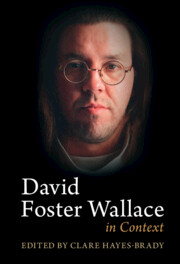Book contents
- David Foster Wallace in Context
- David Foster Wallace in Context
- Copyright page
- Contents
- Figures
- Contributors
- Acknowledgments
- Abbreviations
- Introduction
- Part I Contexts
- Part II Ideas
- Chapter 10 David Foster Wallace and Attention
- Chapter 11 After Analysis
- Chapter 12 Perfectionism and the Ethics of Failure
- Chapter 13 The Pragmatist Possibility in David Foster Wallace’s Writings
- Chapter 14 A Tale of Two Theses
- Chapter 15 Free Will and Determinism
- Chapter 16 David Foster Wallace’s Mathematics of the Infinite
- Chapter 17 David Foster Wallace and Existentialism
- Chapter 18 David Foster Wallace and Religion
- Chapter 19 Mr. Consciousness
- Part III Bodies
- Part IV Systems
- Works by David Foster Wallace
- Bibliography of Secondary Sources
- Index
Chapter 11 - After Analysis
Notes on the New Sincerity from Wallace to Knausgaard
from Part II - Ideas
Published online by Cambridge University Press: 18 November 2022
- David Foster Wallace in Context
- David Foster Wallace in Context
- Copyright page
- Contents
- Figures
- Contributors
- Acknowledgments
- Abbreviations
- Introduction
- Part I Contexts
- Part II Ideas
- Chapter 10 David Foster Wallace and Attention
- Chapter 11 After Analysis
- Chapter 12 Perfectionism and the Ethics of Failure
- Chapter 13 The Pragmatist Possibility in David Foster Wallace’s Writings
- Chapter 14 A Tale of Two Theses
- Chapter 15 Free Will and Determinism
- Chapter 16 David Foster Wallace’s Mathematics of the Infinite
- Chapter 17 David Foster Wallace and Existentialism
- Chapter 18 David Foster Wallace and Religion
- Chapter 19 Mr. Consciousness
- Part III Bodies
- Part IV Systems
- Works by David Foster Wallace
- Bibliography of Secondary Sources
- Index
Summary
Adam Kelly has persuasively argued that Wallace’s oeuvre should be understood through the prism of New Sincerity, which is to say a late- or post-postmodernist quest to balance cynicism with a return to what Wallace called “single-entendre principles.” While the new sincerity paradigm is not without its critics, sincerity is indisputably central to Wallace’s ethical system, and its personal and authorial challenges provide some of the most compelling moments in his writing. The apparent sincerity of his authorial voice has been one of his most appealing attributes, and Wallace himself commented frequently on the fraught dynamic between author and reader, simultaneously predicated on sincerity and manipulation. This chapter traces the role of sincerity as, on the one hand, a sort of artistic telos for Wallace and, on the other, an endlessly thorny problem that springs up in every facet of contemporary life. The chapter goes on to highlight Wallace’s influence in contemporary fiction, highlighting Karl Ove Knausgaard as an author who explores similar questions.
Keywords
- Type
- Chapter
- Information
- David Foster Wallace in Context , pp. 119 - 128Publisher: Cambridge University PressPrint publication year: 2022

